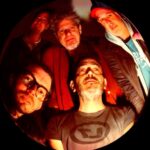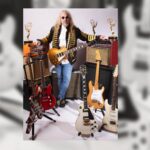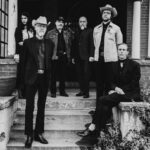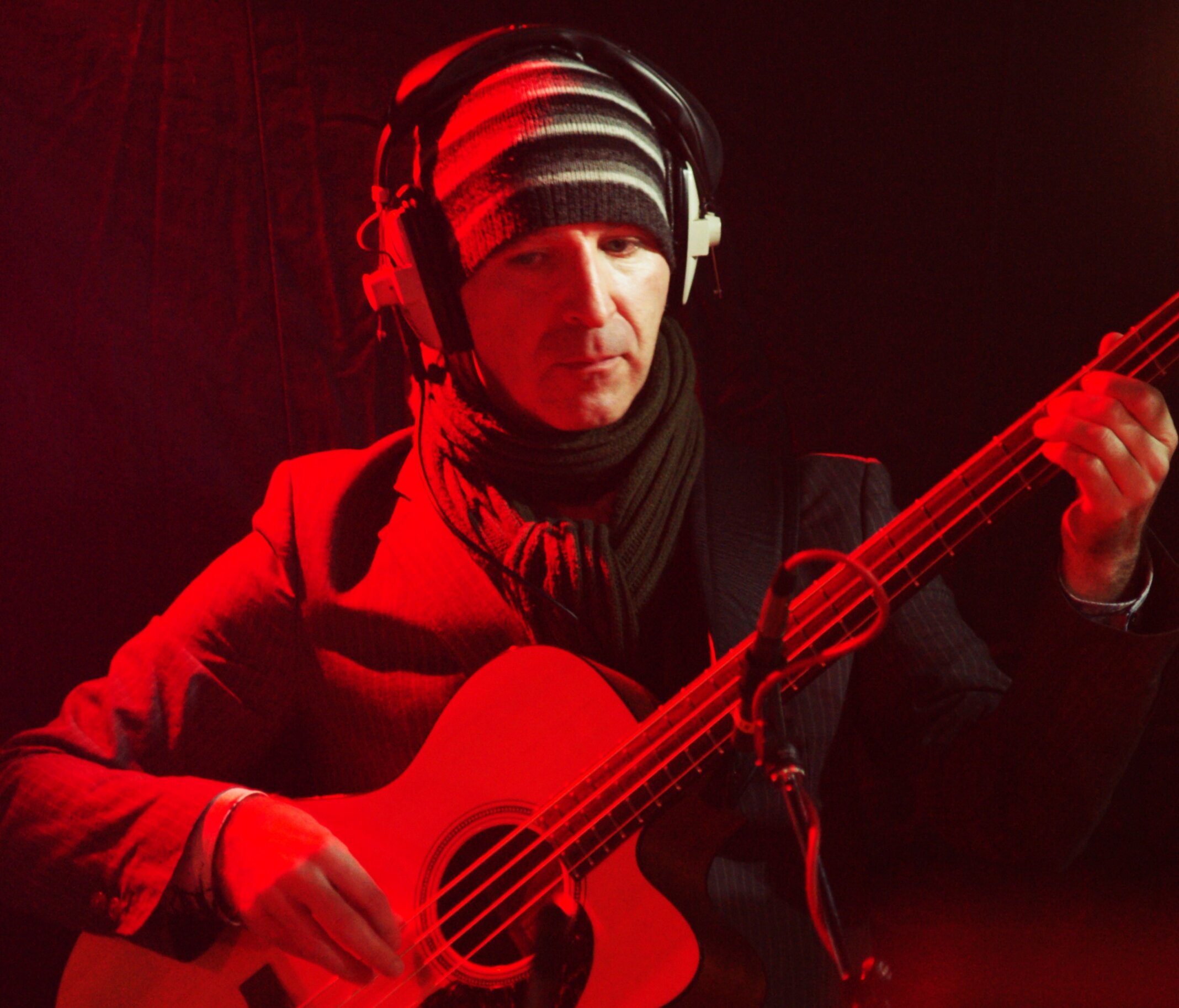
Some artists carry with them a legacy that’s not just a burden but a profound source of inspiration. Malcolm Bruce, son of Jack Bruce, embodies this duality as a composer, singer-songwriter, and multi-instrumentalist. In Jason Barnard’s open conversation with Malcolm about the new album, Heavenly Cream, we delve into the project’s origins and what listeners can anticipate. Heavenly Cream is a tribute to Cream’s catalogue, masterminded by the late Cream lyricist Pete Brown, and featuring a remarkable ensemble of musicians, including Ginger Baker. Malcolm takes us behind the scenes of this landmark project, that now also serves as a tribute to the artists involved that we have lost.
Tell us about your new album, Heavenly Cream. What inspired the project, and what can we expect from it?
The album was really the brainchild of Cream lyricist Pete Brown, who sadly passed away recently. Pete came to myself, producer Rob Cass, and film director Mark Waters with the idea of recording acoustic versions of Cream songs and shooting a documentary about the project. From that point we started reaching out to various artists that we wanted to be involved. Very quickly we got a sense of who might form the basis of the project. Bernie Marsden was instrumental in securing Joe Bonamassa, and Pete had some specific people in mind like Bobby Rush that he wanted involved. And of course we felt that asking Ginger Baker, the original drummer for Cream, would be a fantastic addition, and it was wonderful when he agreed. The rest of the cast members are all wonderful and came on board with a positive attitude, so I feel people can expect a very sensitive and respectful approach to a stellar and historic catalogue of incredible music.
When I spoke to Pete Brown in late 2021, he was incredibly proud and passionate about Cream Acoustic, as it was then known. What was the creative process with Pete putting this together?
Pete was so committed to the process, and I feel his level of experience brought a lot to bear on its success. Rob Cass is a great producer in the sense that he knows when and when not to involve himself. That is something I learnt also from my father Jack; how to find the balance between directing and allowing in the studio, and for that matter also onstage. So when it came to the creative process, once the artists were secured and we had worked with them on matching songs that were appropriate, we then set about creating arrangements to the degree that was required for each song. Some arrangements were developed outside the studio, i.e. the songs that required string arrangements or horn arrangements, and other songs were developed in the room collectively. The nature of this kind of music is very much driven by spontaneity, convention, simplicity, ‘feel’. And I think we all collectively shared that understanding to whatever degree. So we did have charts and notation for each song, but that was balanced by the understanding of this kind of music and how it is formed collectively.
Heavenly Cream features performances by many amazing musicians like Joe Bonamassa and Paul Rodgers, including some that are no longer with us, like Ginger, Pete, Bernie Marsden and Mo Foster. Can you share any memorable experiences from working with these artists on the album?
It was wonderful that Ginger came to perform, and it ended up being his final recording sessions. He was with us on 2 separate days, firstly with Nathan James singing, along with Pee Wee Ellis, the wonderful sax player from James Brown’s band who is also sadly no longer with us. Also Henry Lowther and others, so Ginger had some familiar faces around him. On the second day we were with Joe Bonamassa, Bernie Marsden, Neil Murray and Abass Dodoo, the Ghanian master percussionist who was Ginger’s friend and also band member in Ginger’s band for many years. Ginger was characteristically brusque on both occasions, as he tended to be in these situations. But he played marvellously and we managed to capture his orchestral approach to drumming that is so unique. At the end of the second session, he asked to speak with Pete Brown and they spent 10 or 15 minutes alone chatting. Afterwards Pete told us that it had been a very positive and healing conversation. The long history shared between these 2 men is hard for us to comprehend. True pioneers in the context of the history of popular music. And the twists and turns and things said and done. Pete seemed to feel that Ginger was making amends somehow. Perhaps he knew that this would be the last time to put things right between them. Regardless, it seemed a very moving moment for Pete.
As for all the other fantastic artists involved, they all brought so much to the sessions. Joe Bonamassa was wonderful as he always is. I met him back in the 90s when we were both starting out, at a show in LA when I was in a band called Lost City and he was in Bloodline. And actually Joe remembered when we chatted about it which was nice. Bobby Rush brought an incredible energy to the studio, having flown in on the same day. Just a great person to be around and such a great history. And of course the late great Bernie Marsden was always a joy. We were all very sad to see him leave us this year.
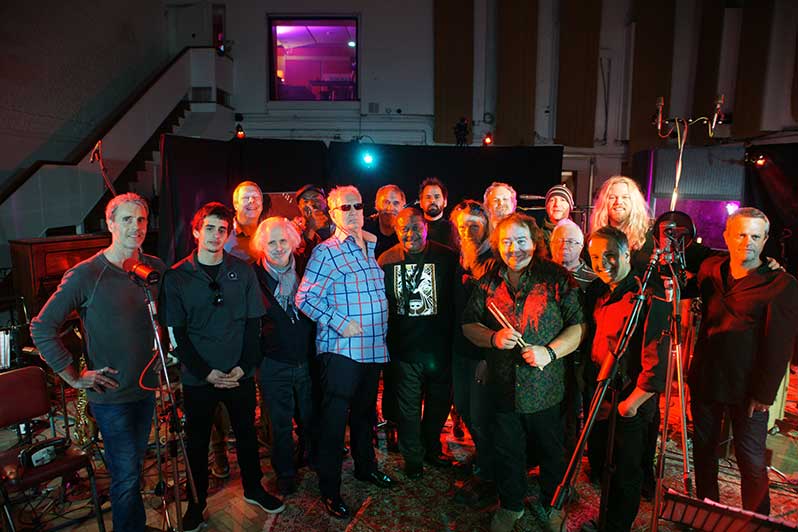
Much of the album was recorded at Abbey Road Studios. What was it like working in such an historic studio, and did it influence the sound of the record?
Whenever I have recorded at Abbey Road, I always have that sense of being somewhere hallowed and sacred. Like a church of sound. Those historic sonic experiences seem to have become affixed to the location itself, like where someone prays, or meditates. It really is a wonderful place to be. And that sense of spaciousness, of sacredness, does influence how one acts and performs. It makes us up our game! I think most people who are sensitive to these things would feel the same in those rooms that have created such iconic recordings. And yes, the sound of the rooms, especially Studio 2, the famed Beatles studio, have a particular resonance and vibe that does come across on the recordings. It has always been a joy to record there. I want to go back!
Heavenly Cream is set to be accompanied by a documentary, The Cream Acoustic Sessions. Can you give us some insights into what we can expect from the documentary?
Well, I haven’t actually seen the thing all the way through yet, but I hear it is fascinating. It contains fly on the wall elements, footage of the actual recording sessions and performances, as well as interviews with the artists involved.
Sometimes with these things one is just too close to it all and there might be a little bit of fear in watching it. I might take the Johnny Depp approach to film making and never watch anything I am in, ever! In some ways, when one is involved in creating something, the process is what it is all about, and the end result can be uncomfortable or feel out of context. I think it all depends on what the project entails. As I wasn’t the producer of the record, or the director or editor of the documentary, it might be better that I don’t watch the thing. I might have an opinion about it and not be able to change it. Of course, I am in no way professing to be a control freak! Mark Waters is a wonderful director, so I’m sure it will be amazing. Knowing Mark, there will be some insightful aspects and I would imagine quite a lot of humour as well. It is also strange for me to consider, as we created this project a number of years ago and I feel like since then I have shed a skin or two spiritually and creatively, and continue to do so, so I am just a little intrigued by what it might be like. It can be the nature of recording and filming, and how many do not like to see themselves or hear themselves after the fact. Music and creativity can sometimes be expressed so much in the moment, be of the moment, and a record of that takes on a different context, or can do. And it’s all so subjective. It can become a meta reality. Like this convoluted deflection from the answer to your question!
But seriously, one aspect is that as we have mentioned, a number of the people involved in this project are no longer with us, namely Ginger Baker, Pete Brown, Bernie Marsden and Pee Wee Ellis. So from that perspective it becomes a kind of historical document, and a way for us to celebrate those amazing people that gave us so much with their creativity.
How has your father’s influence shaped your music and career?
Well, I’m just getting started really. It’s been a blessing and a curse to have such an iconic artist as my Dad. One can be forever in the shadows, not because of lack of talent, but because of internal and also external assumptions and expectations.
Musically my father’s openness to the diversity of musical possibilities coupled with his knowledge of tradition has been an influence. It has been rare that someone with a depth of understanding about classical music and jazz etc., has brought those concepts to bear within popular music idioms. I hear it sometimes within Townshend’s work, with his ideas of song cycles and the way things are orchestrated. But generally we do not hear ‘development’ in popular music, or when we do these things tend to become codified and generic over time. I think we have so much more to explore, infinite avenues.
My sense of my father’s underrated importance in the pantheon of music history can be frustrating at times. Perhaps I share a frustration with him that the music business is often less about talent and innovation, and more often about culture, commerce, agenda and control. We live in such desensitised times, where there is so much that is left out of the narrative for various reasons. But that is a big discussion. Economics, visibility, the context of cultural dissemination, mass formations within narratives, who gets to choose whatever unfolds, the individual vs the collective, how institutions are structured. Consciousness. Creativity and how that is defined. How much of that is automated, and what aspects of that process become autocratic in terms of dissemination. The illusion of democracy.
Ultimately, my father has taught me a kind of musical sensibility, an understanding of the depth of feeling that can emerge from musical expression. Much of this through the novelty of musical construction. But it is simplicity, not complexity. It is playfulness. Just like in life, we experience across a spectrum running between convention and novelty. And this is what truly great music can express. New ways of seeing, new ways of feeling, and access to the divine ground state of Being. I think at his best my father transcended to those levels. That is all an artist can hope for. Oh, and he wrote some wonderful songs too!
You’ve toured and performed with numerous artists over the years. Can you share a standout moment or story from your time on the road with some of these artists?
The last show of a tour when I was with fretless guitarist Ned Evett opening up for Joe Satriani, Joe and band came out on stage in the middle of our set dressed as cleaning ladies and started vacuuming and sweeping the stage. That was very amusing. I’m just glad they didn’t do the ‘get the support band naked and hoist them up above the stage’ routine. Phew.
Honestly, there are so many memories it is hard to pinpoint one specific thing… but here’s one: I was in Sorcerer Sound in NYC with my Dad during sessions for one of his solo albums, and we ordered lunch when we were in the control room with some guy called Mack Rebennack (Dr John). When I pulled out my vegan sandwich, Mack called me a ‘vegeterrible’. That one always stuck with me, not least because the last time I saw him was a few years later when I bumped into him with his minder, as we were queuing up in a health food store in the East Village, buying, you guessed it, veggie health food!

Your upcoming album, Fake Humans and Real Dolls, is set for release next year. Can you give us a glimpse of what to expect?
I’m still in the middle of writing and recording. It’s been a long process. Much of that has to do with the incredible things that are continuing to unfold on this planet, and the process of what I am trying to say. I’m writing new material all the time, already 15 songs recorded but I will develop another few before deciding what this should be. It’s an interesting time to be a writer. The narratives are being controlled more and more, art is becoming narrower in its intentions but there is also more freedom as the record industry appears to decentralise.
My meditation practise continues to unfold self realisation to the point where everything in the apparent universe is in flux. What is the nature of reality. Who am I as an individual (there is no individual). What is this thing called experience (self referral consciousness) and how must that be negotiated. How is that expressed through the creative process. And now with the inception of artificial intelligence, and the implications of that on the creative process, on economics, on identity, on the conventions of what could be termed the human paradigm that is generally accepted as ‘reality’, ‘we’ are at a crossroads. Whether that ’singularity’ is being perceived or whether people continue as they are and discuss the weather and whether Trump or Biden is better. It is all changing incredibly fast. There are huge forces unseen. Conspiracy theories. Conspiracy fact. Trans humanism. Post humanism. Quantum computing. Unconscious motivations. Narcissism. Codependencies. Manipulation. Greed. Ego. Me, me, me. Enough about me, what do you think about me? And then simple connection. Love. Empathy. Kindness. Turning up to give, unconditionally. But it’s a tall order to express within this context. It is all contextual. We are looking for an age of innocence that has been lost to something huge and invisible and out of our hands. And these things could start to become indivisible from each other. An infinite number of books written by AI and read by no one. What a great idea. And it’s only $19.99 per month. Where do I sign up?
The trouble with Self-realisation is that One still wants to connect but it becomes challenging because the connection is happening with source. Delusion and relativity can appear as an easier sell. And certainly more enticing to many.
So, how am I going to express even some of that in a rock record?? Wish me luck.. but it IS coming, and I think it will be a powerful statement. And it will be a theatrical show. Dare I say it, a little conceptual, and a little controversial.
Your guitar playing is often described as explorative and passionate. How do you approach guitar playing as a means of expressing your musical ideas and emotions?
The guitar is to me one of the most expressive instruments, akin to the voice, but it has the ability to channel the individual personality, the uniqueness of that person’s sound. You really hear that, in the context of jazz, rock and blues. Especially with the earlier generation of guitarists, like Charlie Christian, BB King, Eric Clapton, Jeff Beck, etc. The list goes on. We could cite Allan Holdsworth, John Scofield, even Pat Metheny at times, who certainly has had an incredible way of structuring his music melodically which is where his personality comes through. And such a lovely feel and touch. The guys in Radiohead have found some beautiful and unique ways of expressing through predominantly a textural approach. I have found them to be inspirational at times. So I think for me if I was to aspire to something in this context, it would be to continue to discover my own ‘sound’ on the instrument, which comes through a physical sensibility, vibrato, the subtle bending of tone only possible on a stringed instrument. But ultimately touch and phrasing. And an electric guitar can add other elements of timbre that can play a part in the personality coming through. But it’s all essentially in the fingers. It’s not something I want to intellectualise too much. I think it just emerges over time for some people. So the challenge for me right now is discovering, in the context of a rock record, how to balance harmonic and melodic ideas within a song structure, and still create something accessible, radio friendly, but innovative, unique and novel, through feeling my way through the process of discovery. I love to find ways of doing things that aren’t predictable. And hopefully with Fake Humans that will be evident to whatever degree.
Can you share some details about your role on Pete Brown’s new posthumous album The Shadow Club?
I was just the bass player on Pete’s record. It was an honour to be involved. We tracked the album with Richard Bailey, the wonderful drummer who’s played with so many of the great artists like Bob Marley and Steve Winwood, and Clem Clempson and Mo Nazam on guitars, with John Donaldson playing keys. There are some lovely guest performances as well. Eric Clapton is playing on the title track, which is my favourite song on the album. It’s a beautiful lyric, looking back across the span of their collective careers and citing some of those who influenced them as they were coming up. I think Pete was very proud of the recordings. It’s still strange to think he isn’t with us anymore, he was always a part of my life. I wrote around 20 songs with him over the years, 3 of which will be on my new album. So apart from Pete’s spirit shining on us, he will be living on through his music and powerful words. And I hope the record gets the attention it deserves.
As you are also a composer of orchestral music, what draws you to this genre, and can you tell us about any upcoming orchestral projects you’re working on?
I’ve always been involved with classical music since I was a child. I’m interested in expanded forms and so I am attracted to the orchestra and its possibilities. As I said before, I’m just getting started! Breaking the fourth wall here for a minute, for whatever reason I have yet to find a way into these ‘scenes’, I’m essentially an outsider. But I do have a lot of chamber and orchestral works developing which I hope see the light of day. I’m also composing opera, I’m halfway through completing ‘King You’s Folly’, an opera based on an ancient Chinese fable from the late Western Zhou Dynasty, and I’ve just completed a libretto based on the short story ‘A Story Of The Stone Age’ by HG Wells. A Stone Age opera! It’s an incredibly beautiful premise with singing bears and horses, and a love story between 2 stone agers.
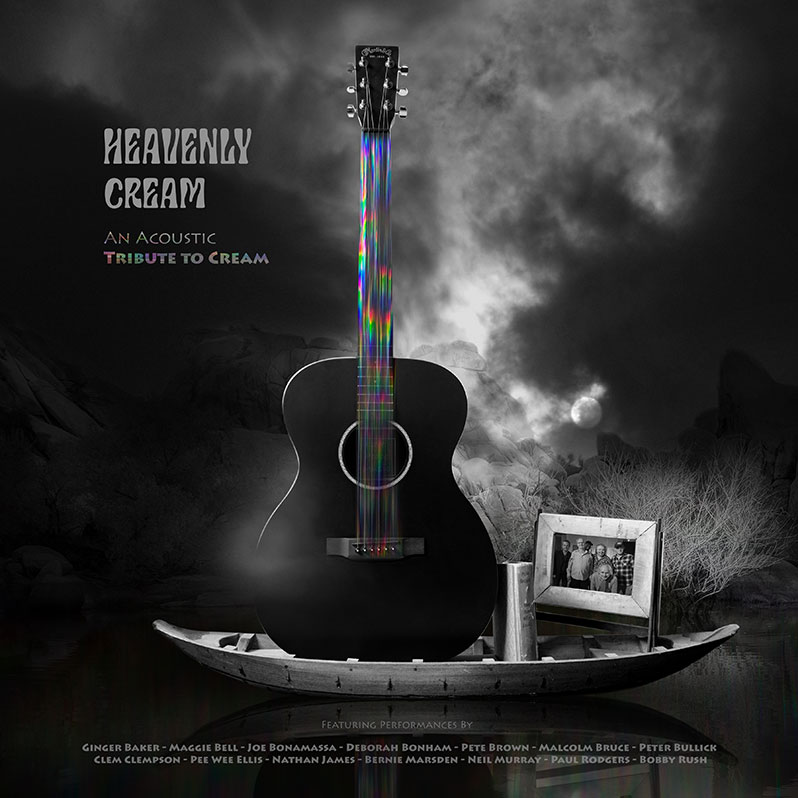
Looking ahead, what are your goals and aspirations as an artist?
My goals are to get my current projects completed and out into the world. It’s a huge undertaking. I feel that this will be happening for me in this next phase of my career. It’s a period of consolidation and moving forward. And I’m grateful to be able to work on it all. I want to come out of the shadow of my father and ironically perhaps the best way to do this is to celebrate his amazing work via this incredible record Heavenly Cream and then transition fully into my own work again. It’s been a great honour to be involved in the project. We are all incredibly proud of it.
Further information
The first single, Sunshine Of Your Love by Heavenly Cream feat. Joe Bonamassa and Bernie Marsden is available to stream now.
Heavenly Cream: An Acoustic Tribute To Cream will be released via Quarto Valley Records on November 3rd on Double 180 Gram Limited Edition Cream-Colored Vinyl, CD and Digital on all platforms and is now available for PRE-ORDER.
